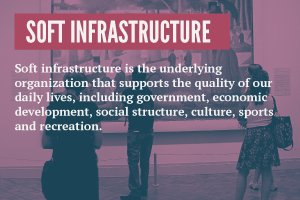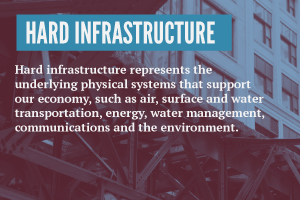Operational Principles
The Trust is constantly building and improving upon a set of operating principles and best practices, based upon the needs of Chicago and knowledge from successful infrastructure programs around the world.
The Trust is constantly building and improving upon a set of operating principles and best practices, based upon the needs of Chicago and knowledge from successful infrastructure programs around the world.
Hard Infrastructure and Soft Infrastructure Chicago’s infrastructure needs include addressing the physical infrastructure of the City while positively impacting the daily lives of our citizens, whether it is considered “hard” infrastructure or “soft” infrastructure. Hard infrastructure represents the underlying physical systems that support our economy such as: air, surface and water transportation, energy, water management, communications and the environment. Soft infrastructure is the underlying organization that supports the quality of our daily lives, including: government, economic development, social structure, culture, sports and recreation.
Brownfield and Greenfield Projects Our opportunities include brownfield and greenfield projects. Brownfield projects involve the renovation of current assets, while greenfield projects create new infrastructure assets.
Operational and Maintenance Support The Trust will initiate projects and play a leadership role in project scope, design, procurement and implementation. Following implementation, responsibility for ongoing operations and maintenance may shift to the City or a private company.
RFPs, RFQs, and RFIs The Trust will use a mix of Requests for Proposals (RFPs), Requests for Qualification (RFQs), and Requests for Information (RFIs) for competitive bid projects. This will ensure the people of the City of Chicago benefit from the greatest professional expertise from the private sector and the best financial terms. In addition, this will enable the Trust to maintain activity against short-term, mid-term and long-term ideas and projects.
Unsolicited and Collaborative Bids Private entities or individuals may choose to submit proposals to the Trust when no RFI/RFQ/RFP has been issued. Submissions should be sent to . In some instances, the Trust will work with a potential partner to develop an approach or proposal to address a specific opportunity.
Repeatable Project Model The Trust will pursue some projects that can be executed / proven on a limited basis or in a limited geography, then repeated on a broader basis. However, the Trust will avoid demonstration projects that will diminish the overall value of projects to investors.


Gain Alignment and Manage Expectations The Trust will follow a disciplined process during project development to ensure alignment across the City’s departments and agencies while approaching private sector investors and operators. This will create a well-defined scope and timeline, managing the expectations of investors / operators and securing the best financial terms for the people of the City of Chicago.
Best Practices Models The Trust will follow industry-proven best practices for projects. This increases stability and manages expectations for investors, which in turn enables the City to receive the most favorable financial terms on projects.
Joint Ventures / Private Equity The Trust may use joint ventures and private equity to launch projects. By using these resources to fund a project the Trust creates a more attractive opportunity for private investors and again secures better terms for the City of Chicago.
Public Private Partnership (P3) Investments The private sector has significant interest in investing in P3 infrastructure projects in Chicago. For major investors, P3 infrastructure projects are a proven model based on experience in the US, Canada and abroad. Funding from private sources can come in several forms including direct equity investment, funding via debt and Community Reinvestment Act (CRA) funds from pension funds and major banks.
State, Federal and Private Grants Specialized grants and loans for infrastructure are available from the federal and State of Illinois governments and from the private sector. The Trust continuously tracks availability of these funds and will apply for them on any project where they are available and appropriate.

The Trust will secure alignment among stakeholders from all relevant departments and agencies of the City of Chicago during RFI, RFQ and RFP processes. This will create stability in the procurement process and provide assurance to participants of the City of Chicago’s commitment to projects for which bid requests are released. Approval of terms of final bids pertaining to the City may be subject to public input and approval of the Chicago City Council prior to contracting.
The Trust may maximize efficiency and create project scale to improve terms by functioning as a central contact for parallel projects across multiple City departments or agencies. For example, if several City agencies and departments are pursuing conversion of buildings to solar energy, the Trust may act as a leader for a cross-agency RFI/RFQ/RFP process, identification and selection of suppliers, financial options, procurement and coordination of performance and compliance monitoring.
Ongoing communication with key stakeholders is a critical best practice to manage and execute projects and to identify and minimize risks to timeline, budget and performance.

Over time, it is important to understand the state of our infrastructure from outside sources such as the American Society for Civil Engineers (ASCE) report card, which is updated every four years. The ASCE released a national update in 2013, along with a state-level breakout for Illinois. The Trust is working with the ASCE to create a set of ratings specific to Chicago and to understand what actions will be required to improve ratings.
Please click here to see the ASCE 2013 national score card. http://www.infrastructurereportcard.org/
Please click here to see the most recent ASCE scorecard for Illinois. http://www.infrastructurereportcard.org/illinois/illinois/
The Trust will consider how its projects align to ratings in order to help measure project impact.
